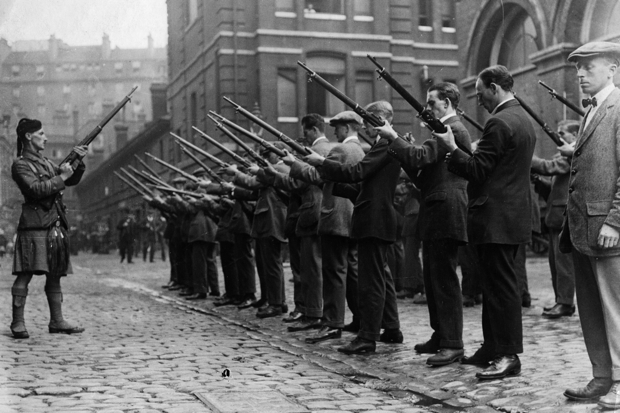From ‘Rifle clubs and village guards’, The Spectator, 15 August 1914. John St Loe Strachey, in addition to being High Sheriff of Surrey, was the editor and owner of The Spectator:
We understand that the High Sherriff of Surrey, Mr. St. Loe Strachey, is this afternoon holding a Conference of the Surrey Rifle Clubs at Brett Reynard’s Restaurant, Guildford, at five o’clock, with the object of making proposals for the formation of Town and Village Guards. It must be obvious to every one that it would be an enormous if every small town and village had such Guards, and if the police and military authorities could, in the case of emergency, could find an organised body, even though roughly organised, ready to co-operate with them. Mr Strachey proposes that wherever there are Rifle Clubs – and there are such in most villages and towns in Surrey – they should constitute themselves Town or Village Guards; that is, the Rifle Club organisation should be made use of, for, if it can possibly avoided, nobody must create a new organization when there are old ones existing capable of doing the work. The danger of the Village Guard proposal is that people may think that by joining a Town or Village Guard they have done all that is necessary to prove their patriotism. Therefore Mr Strachey proposes that it should be an essential condition of joining a Village Guard that a man shall not be the age to join Lord Kitchener’s new Army of half a million men. No man, that is, must be taken for a Village Guard – except very temporarily – unless he is under nineteen or over thirty. Further, the members of the Village or Town Guard should deem it their first duty to induce every man of military age whom they can influence to volunteer for the Second Army. We must not rest till we have got Lord Kitchener his men. Every scheme, semi-military or philanthropic, must give way to this all–urgent need. In cases where there is not a Town or Village Rifle Club some person capable of taking lead in the village should call a meeting of the male inhabitants and organise a Guard.
It may be of use for the present writer to describe briefly how he helped to form such a Guard in his own village. Last Sunday night at about half-past ten a neighbour, one of the leading men in the county district, telephoned to him that the police had just called to ask for volunteers to guard the bridges on the railway, as the constables who had been doing the work hitherto were exhausted, and must be relieved at all costs of some of the work. He, of course, turned out and took with him his own commando of chauffeurs, footmen, grooms, gardeners, &c. About soon twenty men were soon assembled by the big house, and these were split up into night Guards and day Guards, and within some forty minutes the present writer, with his son, found himself on a railway bridge shouldering a shotgun, and making the necessary arrangements with his two village colleagues to keep the bridge protected till he and his party where relieved at about a quarter past two. The next day it fell to him to organise a Village Guard in a place where there was no Rifle Club.
Accordingly he got his friends and neighbours to meet him on the principal railway bridge near the railway station at seven o’clock in the evening, and then enrolled some fifty men as Village Guards. These were divided into night and day watches for guarding the three railway bridges in the parish. There was no difficulty in getting men for the night Guards. The day Guards were a great difficulty, as there are few or no unemployed, rich or poor, in that village. However, employers of labours were most sensible in regards to letting their gardeners go, and therefore the obstacle was ultimately got over.





Comments